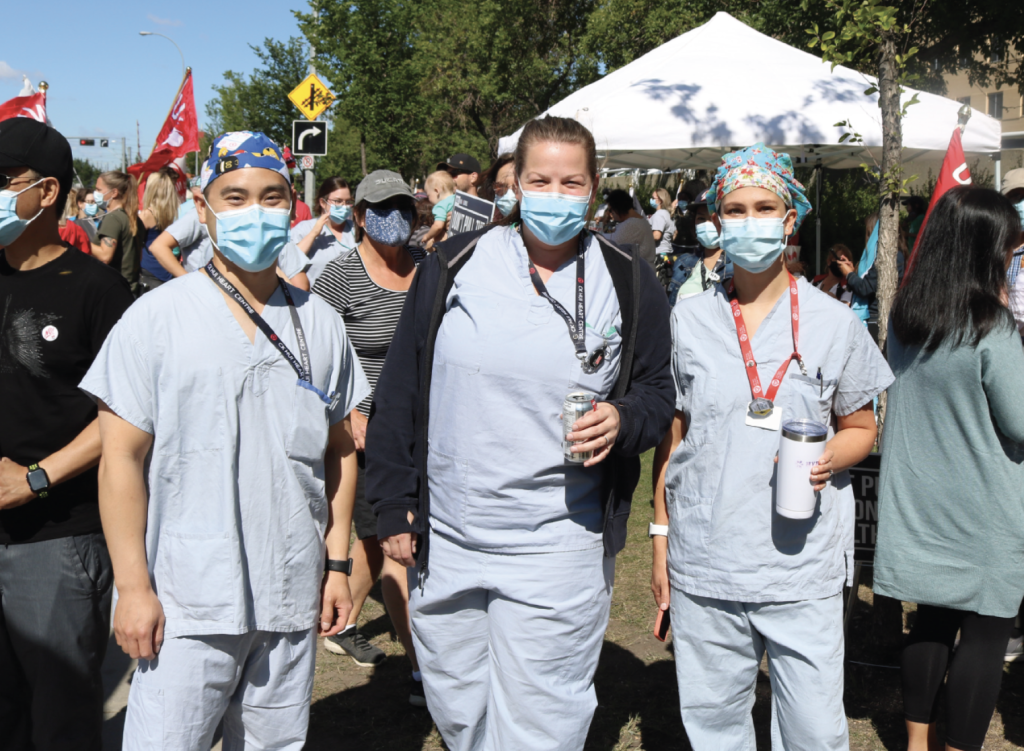Interviews with Friends of Medicare Activists
Click here to read a history of medicare and Friends of Medicare in Alberta.

These interviews conducted by the Alberta Labour History Institute provide important insight into the history, successes, and struggles of Friends of Medicare and their work with labour in Alberta.
Since 1979 Friends of Medicare has played an important role in defending the principles of Canada’s universal public health system both in Alberta and nationally. The only stipulation for membership has been a concern for the preservation of the five principles of Medicare: comprehensive coverage, universality, accessibility, portability of benefits, and public administration on a non-profit basis. The story of the Friends of Medicare is not just the story of a group of volunteers who happened to care about public medicine. It is the story of citizen action and resistance to successive governments concerned with money over people
Friends of Medicare is a coalition of many individuals and organizations, from physicians to patients, seniors’ organizations, cultural and community groups, and of course labour unions. The formation of Friends of Medicare was inspired by a document produced by the Alberta Federation of Labour (AFL) in 1979. Titled Friends of Medicare’s Concerns on the Erosion of Medicare in Alberta the submission was principally concerned with the pervasiveness of extra billing practices by doctors after the federal formula for Medicare funding changed from a straight fifty percent cost share to a system of tax transfers.
Extra billing went against the principles that ability to pay should not impact people’s need for health care. This fight contributed to the creation of the Canada Health Act in 1984.
The organization continued through the 1980’s, and was at the forefront once again with the election of Ralph Klein’s PC government on promises to greatly cut health care funding in the province. Klein’s Liberal opposition under Lawrence Decore had run on a similar platform, leaving no credible opposition to the Klein agenda in the legislature from 1993 to1997. Friends of Medicare would act to fill the void, opposing cutbacks and privatization, while catching the attention and intervention of the federal government around fees in MRIs and other areas.
Klein became a constant foe, with Friends of Medicare working to oppose the Hotel d’Health in Leduc, private health care bills 37 and the greatly opposed Bill 11. Looking back on his career, Klein has remarked that one of his regrets is being unable to “reform” health care through privatization, and Friends of Medicare were there every step of the way to push back.
The post-Klein period in Alberta did not mean an end to challenges for health care. Private continuing care continued to flourish; threats of bed closures and billion- dollar cutbacks were resisted. Alberta Hospital Edmonton, an important mental health facility serving northern Alberta and patients from the territories was threatened with closure under Ed Stelmach, and Friends of Medicare continued to successfully fight to defend the system from cutbacks and closures.
These interviews are valuable for capturing the details and personalities involved along the way. Always “punching above their weight,” Friends of Medicare should be remembered not only for their fights defending their system, but as advocates for a vision of improvement and expansion of medicare shared by Tommy Douglas and so many others.
Seniors’ care, prescription drug coverage, dental care, vision care, and community- driven physician care have been key pieces of the medicare puzzle that Friends of Medicare have been insisting must come together.
While conservative governments were defeated provincially and federally in 2015, private care and their wealthy advocates remain. The work of Friends of Medicare and the labour movement continues. Visit www.friendsofmedicare.org to keep up to date.
Trevor Zimmerman
Former Communications and Administrative Officer, Friends of Medicare
